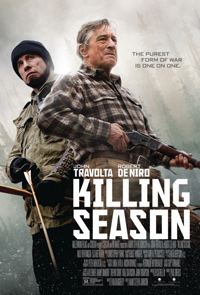Karma Con: Johnston’s Latest a Scene Chew to Remember
 Originally intended as a vehicle to reunite those crass offenders of subtlety, Nicolas Cage and John Travolta (with helmer John McTiernan in tow), the once titled 1970s set Shrapnel mutated into Mark Steven Johnson’s modern day Killing Season with Robert De Niro replacing Cage. While initially this seems like an accidentally lucky scenario for the film’s predestined doom, De Niro’s presence distractingly inverts the material into what feels like The Deer Hunter: Part Deux. Despite its swift descent into high camp, the film still manages to numb us into a repetitive lull during its last half, all bark and no bite as it waffles between bloodthirsty revenge flick and a catch-and-release confessional.
Originally intended as a vehicle to reunite those crass offenders of subtlety, Nicolas Cage and John Travolta (with helmer John McTiernan in tow), the once titled 1970s set Shrapnel mutated into Mark Steven Johnson’s modern day Killing Season with Robert De Niro replacing Cage. While initially this seems like an accidentally lucky scenario for the film’s predestined doom, De Niro’s presence distractingly inverts the material into what feels like The Deer Hunter: Part Deux. Despite its swift descent into high camp, the film still manages to numb us into a repetitive lull during its last half, all bark and no bite as it waffles between bloodthirsty revenge flick and a catch-and-release confessional.
An opening prologue briefly outlining the cruel circumstances of the early 90s Yugoslav conflict resorts to supposedly random acts of sun soaked violence, bullets holes and emaciated corpses fellating our senses until we hone in on a group of US soldiers executing a group of Serbian soldiers that had been torturing women and children in a small village.
The last in the lineup happens to be Emil Kovac (John Travolta), who, unbeknownst to his executioner, Benjamin Ford (Robert De Niro), inexplicably survives a deadly gunshot. Nearly twenty years later, Kovac at last has discovered the identity of his assailant, and thus stalks the retired NATO soldier at his hunting cabin up in the Appalachians. However, Ford’s actions during the war seem to have left a heavy burden as he isolates himself in his cabin, even avoiding his son (Milo Ventimiglia) who plaintively wishes his father would attend the new grand kid’s baptism. Rather than hunt the mighty elk that inhabit the picturesque mountains, Ford prefers to photograph them, a passion that seems to sustain his lonely existence. Some car trouble deposits Kovac conveniently in Ford’s path, and soon a night of bonding eventually becomes a hellish hunting trip where both men hunt and are hunted by the other with Kovac hoping to attain some sort of retribution for Ford’s heinous actions.
While Evan Daughtery’s script contains some potential points of interest, there’s a confounding lack of character development concerning two people we spend nearly 90 minutes with exclusively. At first, De Niro’s Ford has all the makings of a grizzled archaic patriarch, blaring Johnny Cash and, of course, unapologetically displays Hemingway on the bed stand. But De Niro gets swallowed by the mounting ridiculousness of the film, his attempts at subtlety feeling like blandness due to the film’s lack of detail, turning him into the neutered equivalent of his Meet the Fockers curmudgeon.
More than one instance of blunt discussion pertaining to the debilitating effect of war time atrocities, including an instance that feels like a direct rehash lifted from Cimino’s The Deer Hunter, only serve to further unintentional distraction. The rotten core of the film announces itself when Travolta’s over-the-top Serbian accent arrives on the scene, hilariously unintelligible at inopportune moments, sporting a nifty English vocabulary as he uses words like “sabbatical,” but more often than not speaking with grammatically incorrect sentence structures to further remind us of his foreignness (further made ridiculous when the duo get drunk on Jaeger and croon to a Johnny Cash song, which both know by heart).
The casting of an actual Serbian actor, one that doesn’t have his hair painted on to match a soot-colored chinstrap, would have been an ideal choice once the script was revised for its current locale. But one assumes Travolta’s name was necessary for funding or tickets sales, etc. Director Johnson, no stranger to the hammy flourish when you consider his previous filmography includes both Daredevil (2003) and Ghost Rider (2007) seems to have let the cameras roll while his heavyweight stars did whatever they wanted (especially apparent in a role-reversal torture sequence involving fresh squeezed lemonade and lots of iodized salt).
From the opening frames, Christopher Young’s distracting score attempts to insistently provide the cues that the remainder of the film cannot, but unfortunately sounds as abrasive as it does unremarkable—but mention is deserved for consistently overriding whatever’s happening on screen. Initially a contender for one of those so-bad-it’s-good exercises, Killing Season creakily turns into another underdeveloped idea that doesn’t have enough going for it to remain of interest.


